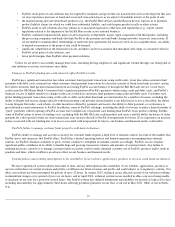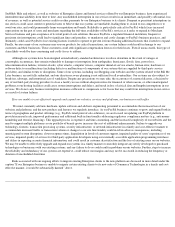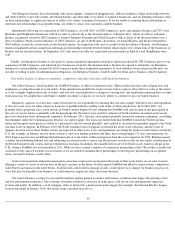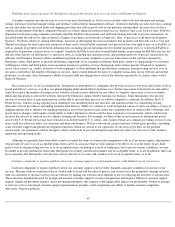eBay 2013 Annual Report Download - page 40
Download and view the complete annual report
Please find page 40 of the 2013 eBay annual report below. You can navigate through the pages in the report by either clicking on the pages listed below, or by using the keyword search tool below to find specific information within the annual report.
StubHub, Milo and others), as well as websites of Enterprise clients and hosted services offered by our Enterprise business, have experienced
intermittent unavailability from time to time. Any unscheduled interruption in our services results in an immediate, and possibly substantial, loss
of revenues, as well as potential service credits or other payments by our Enterprise business to its clients. Frequent or persistent interruptions in
our services could cause current or potential users to believe that our systems are unreliable, leading them to switch to our competitors or to
avoid our sites, and could permanently harm our reputation and brands. Reliability is particularly critical for PayPal, which faces increased
expectations on the part of users and merchants regarding the full-time availability of PayPal's services as it seeks to expand its Merchant
Services business and gain acceptance of its retail point of sale solutions. Because PayPal is a regulated financial institution, frequent or
persistent site interruptions could lead to significant fines and penalties, or mandatory and costly changes to PayPal's business practices, and
ultimately could cause PayPal to lose existing licenses it needs to operate or prevent it from obtaining additional licenses that it needs to expand.
Finally, because many of our customers may use our products for critical transactions, any system failures could result in damage to our
customers and their businesses. These customers could seek significant compensation from us for their losses. Even if unsuccessful, this type of
claim likely would be time-consuming and costly for us to address.
Although our systems have been designed around industry-standard architectures to reduce downtime in the event of outages or
catastrophic occurrences, they remain vulnerable to damage or interruption from earthquakes, hurricanes, floods, fires, power loss,
telecommunication failures, terrorist attacks, cyber attacks, computer viruses, computer denial-of-service attacks, human error, hardware or
software defects or malfunctions (including defects or malfunctions of components of our systems that are supplied by third-party service
providers), and similar events or disruptions. Some of our systems, including our Shopping.com websites and the systems related to the Bill Me
Later business, are not fully redundant, and our disaster recovery planning is not sufficient for all eventualities. Our systems are also subject to
break-ins, sabotage, and intentional acts of vandalism. Despite any precautions we may take, the occurrence of a natural disaster, a decision by
any of our third-party hosting providers to close a facility we use without adequate notice for financial or other reasons, or other unanticipated
problems at our hosting facilities could cause system interruptions and delays, and result in loss of critical data and lengthy interruptions in our
services. We do not carry business interruption insurance sufficient to compensate us for losses that may result from interruptions in our service
as a result of system failures.
If we are unable to cost-effectively upgrade and expand our websites, services and platforms, our business would suffer.
We must constantly add new hardware, update software and add new engineering personnel to accommodate the increased use of our
websites and platforms, and the new products and features we regularly introduce. As our PayPal business continues to grow and expand both in
terms of geographies and product offerings (e.g., PayPal's retail point of sale solutions), we are focused on updating our PayPal platform to
provide increased scale, improved performance and additional built-in functionality addressing regulatory compliance matters (e.g., anti-money
laundering and terrorist financing). This upgrade process is expensive and time-
consuming, and the increased complexity of our websites and the
need to support multiple platforms as our portfolio of brands grows increases the cost of additional enhancements. Failure to upgrade our
technology, features, transaction processing systems, security infrastructure, or network infrastructure in a timely and cost-effective manner to
accommodate increased traffic or transaction volume or changes to our site functionality could result in adverse consequences, including
unanticipated system disruptions, slower response times, degradation in levels of customer support, impaired quality of users' experiences of our
services, impaired quality of services for third-party application developers using our externally accessible application programming interfaces
and delays in reporting accurate financial information, and could result in customer dissatisfaction and the loss of existing users on our websites.
We may be unable to effectively upgrade and expand our systems in a timely manner or smoothly integrate any newly developed or purchased
technologies or businesses with our existing systems, and any failure to do so could result in problems on our websites. Further, steps to increase
the reliability and redundancy of our systems are expensive, could reduce our margins and may not be successful in reducing the frequency or
duration of unscheduled downtime
Risks associated with our ongoing efforts to migrate existing Enterprise clients to the new platform are discussed in more detail under the
caption “If our Enterprise business is unable to migrate certain existing clients to its new suite of Commerce Technologies in a timely and cost-
effective manner, it would be substantially harmed” above.
38
























